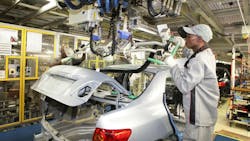PORT ELIZABETH - South Africa's car manufacturers have made a new wage offer in a bid to end a strike that has crippled production for nearly seven weeks, the industry said Wednesday.
Automakers believe most production can restart this week after waves of component manufacturing workers went on strike, adding to earlier stoppages to drag down export 75% last month.
The Retail Motor Industry Organization, which represents component producers, is offering a 10% pay hike this year and 8% annually the next two years, though workers at some auto plants have refused the deal.
The current industrial action has affected seven plants of major car manufacturers including Volkswagen (IW 1000/7), Ford (IW 500/8), Mercedes, Toyota (IW 1000/8), and General Motors (IW 500/5) in a sector which contributes 6% to the economy.
"The signs are reasonably positive," said Nico Vermeulen, executive director of the National Association of Automobile Manufacturers of South Africa (Naamsa).
"Hopefully by Friday or Monday the production will resume in the motor components industry," Vermeulen said after a meeting with workers, owners and the minister of transport.
The National Union of Metalworkers of South Africa (Numsa), the industry's dominant labor group, said it would put the increase to members Wednesday and was pushing for the deal to go through.
But there were objections to a "peace clause" that would forbid workers from downing tools in the next three years.
"We need to persuade our members to accept the offer, but the workers do not want the peace clause included in the agreement," said Numsa regional secretary Phumzile Nodongwe.
Exports Likely to Suffer
Strikers at plants in Pretoria, Durban and East London favor the offer.
But a minority is holding out in coastal city Port Elizabeth, where Volkswagen, General Motors and Ford have operations.
The 78,000 component laborers downed tools more than six weeks ago demanding higher pay, just as car construction workers ended their strike.
Car exports dropped by three-quarters in September compared to 2012 figures under the effects of the twin strikes.
Nedbank analysts said Wednesday the current stoppages would likely brake exports in coming months as well.
"Manufacturers can program and plan to recover some of that lost production, overtime, Saturday work, but the problem is also the longer the strike goes on, the more difficult it becomes to recover," said Naamsa's Vermeulen.
The strikes follow stoppages in mining and construction as competing unions make increasingly radical demands.
Copyright Agence France-Presse, 2013
About the Author
Agence France-Presse
Copyright Agence France-Presse, 2002-2025. AFP text, photos, graphics and logos shall not be reproduced, published, broadcast, rewritten for broadcast or publication or redistributed directly or indirectly in any medium. AFP shall not be held liable for any delays, inaccuracies, errors or omissions in any AFP content, or for any actions taken in consequence.
